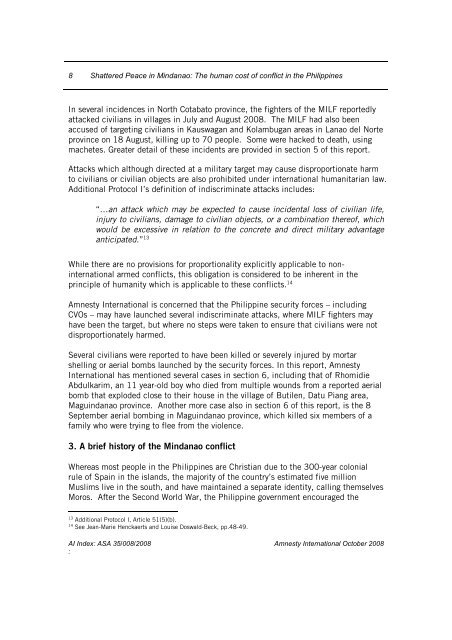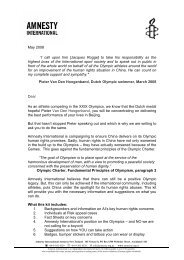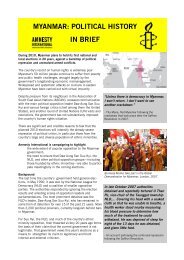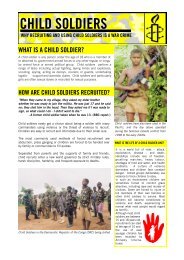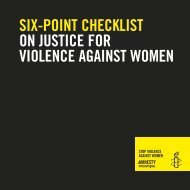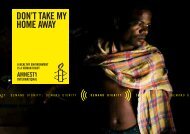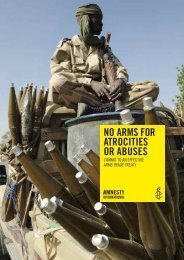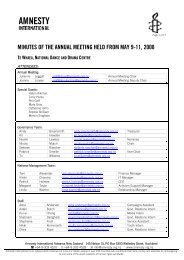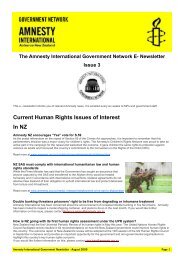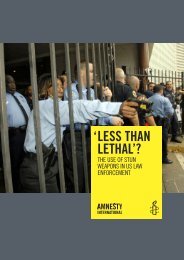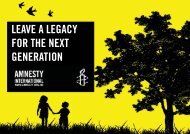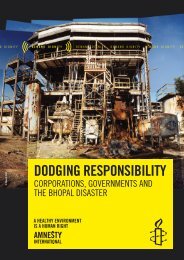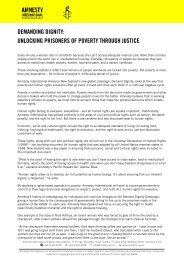8 <strong>Shattered</strong> <strong>Peace</strong> <strong>in</strong> M<strong>in</strong>danao: The <strong>human</strong> <strong>cost</strong> <strong>of</strong> <strong>conflict</strong> <strong>in</strong> <strong>the</strong> Philipp<strong>in</strong>esIn several <strong>in</strong>cidences <strong>in</strong> North Cotabato prov<strong>in</strong>ce, <strong>the</strong> fighters <strong>of</strong> <strong>the</strong> MILF reportedlyattacked civilians <strong>in</strong> villages <strong>in</strong> July and August 2008. The MILF had also beenaccused <strong>of</strong> target<strong>in</strong>g civilians <strong>in</strong> Kauswagan and Kolambugan areas <strong>in</strong> Lanao del Norteprov<strong>in</strong>ce on 18 August, kill<strong>in</strong>g up to 70 people. Some were hacked to death, us<strong>in</strong>gmachetes. Greater detail <strong>of</strong> <strong>the</strong>se <strong>in</strong>cidents are provided <strong>in</strong> section 5 <strong>of</strong> this report.Attacks which although directed at a military target may cause disproportionate harmto civilians or civilian objects are also prohibited under <strong>in</strong>ternational <strong>human</strong>itarian law.Additional Protocol I’s def<strong>in</strong>ition <strong>of</strong> <strong>in</strong>discrim<strong>in</strong>ate attacks <strong>in</strong>cludes:“…an attack which may be expected to cause <strong>in</strong>cidental loss <strong>of</strong> civilian life,<strong>in</strong>jury to civilians, damage to civilian objects, or a comb<strong>in</strong>ation <strong>the</strong>re<strong>of</strong>, whichwould be excessive <strong>in</strong> relation to <strong>the</strong> concrete and direct military advantageanticipated.” 13While <strong>the</strong>re are no provisions for proportionality explicitly applicable to non<strong>in</strong>ternationalarmed <strong>conflict</strong>s, this obligation is considered to be <strong>in</strong>herent <strong>in</strong> <strong>the</strong>pr<strong>in</strong>ciple <strong>of</strong> <strong>human</strong>ity which is applicable to <strong>the</strong>se <strong>conflict</strong>s. 14Amnesty International is concerned that <strong>the</strong> Philipp<strong>in</strong>e security forces – <strong>in</strong>clud<strong>in</strong>gCVOs – may have launched several <strong>in</strong>discrim<strong>in</strong>ate attacks, where MILF fighters mayhave been <strong>the</strong> target, but where no steps were taken to ensure that civilians were notdisproportionately harmed.Several civilians were reported to have been killed or severely <strong>in</strong>jured by mortarshell<strong>in</strong>g or aerial bombs launched by <strong>the</strong> security forces. In this report, AmnestyInternational has mentioned several cases <strong>in</strong> section 6, <strong>in</strong>clud<strong>in</strong>g that <strong>of</strong> RhomidieAbdulkarim, an 11 year-old boy who died from multiple wounds from a reported aerialbomb that exploded close to <strong>the</strong>ir house <strong>in</strong> <strong>the</strong> village <strong>of</strong> Butilen, Datu Piang area,Magu<strong>in</strong>danao prov<strong>in</strong>ce. Ano<strong>the</strong>r more case also <strong>in</strong> section 6 <strong>of</strong> this report, is <strong>the</strong> 8September aerial bomb<strong>in</strong>g <strong>in</strong> Magu<strong>in</strong>danao prov<strong>in</strong>ce, which killed six members <strong>of</strong> afamily who were try<strong>in</strong>g to flee from <strong>the</strong> violence.3. A brief history <strong>of</strong> <strong>the</strong> M<strong>in</strong>danao <strong>conflict</strong>Whereas most people <strong>in</strong> <strong>the</strong> Philipp<strong>in</strong>es are Christian due to <strong>the</strong> 300-year colonialrule <strong>of</strong> Spa<strong>in</strong> <strong>in</strong> <strong>the</strong> islands, <strong>the</strong> majority <strong>of</strong> <strong>the</strong> country’s estimated five millionMuslims live <strong>in</strong> <strong>the</strong> south, and have ma<strong>in</strong>ta<strong>in</strong>ed a separate identity, call<strong>in</strong>g <strong>the</strong>mselvesMoros. After <strong>the</strong> Second World War, <strong>the</strong> Philipp<strong>in</strong>e government encouraged <strong>the</strong>13Additional Protocol I, Article 51(5)(b).14See Jean-Marie Henckaerts and Louise Doswald-Beck, pp.48-49.AI Index: ASA 35/008/2008 Amnesty International October 2008:
<strong>Shattered</strong> <strong>Peace</strong> <strong>in</strong> M<strong>in</strong>danao: The <strong>human</strong> <strong>cost</strong> <strong>of</strong> <strong>conflict</strong> <strong>in</strong> <strong>the</strong> Philipp<strong>in</strong>es 9settlement <strong>of</strong> what was <strong>the</strong>n Muslim-dom<strong>in</strong>ated M<strong>in</strong>danao by Christians from <strong>the</strong>north <strong>of</strong> <strong>the</strong> country. This policy cont<strong>in</strong>ued practice established under US colonialrule, which “set unequal limits on private land ownership for Christians and non-Christians”, 15 <strong>the</strong>reby leav<strong>in</strong>g Muslims <strong>in</strong> M<strong>in</strong>danao “m<strong>in</strong>oritized”. 16 Such measuresfostered discontent among <strong>the</strong> Muslim population about land rights.In <strong>the</strong> early 1970s, a full-scale armed <strong>conflict</strong> erupted between <strong>the</strong> Philipp<strong>in</strong>egovernment and <strong>the</strong> Moro National Liberation Front (MNLF). The <strong>conflict</strong>, whichlasted from 1972 to 1976, displaced a large number <strong>of</strong> civilians. In 1978, <strong>the</strong> MoroIslamic Liberation Front (MILF) broke away from <strong>the</strong> MNLF, with which <strong>the</strong>government subsequently signed a peace agreement <strong>in</strong> 1996. Today, <strong>the</strong> BIAF, <strong>the</strong>armed w<strong>in</strong>g <strong>of</strong> <strong>the</strong> MILF, is reported to have 12,000 fighters operat<strong>in</strong>g <strong>in</strong> several basecommands around sou<strong>the</strong>rn Philipp<strong>in</strong>es, with a stronghold <strong>in</strong> Magu<strong>in</strong>danao prov<strong>in</strong>ce.For its part, <strong>the</strong> MILF has claimed that it has 70,000 registered fighters <strong>in</strong> <strong>the</strong> BIAF,and more than 100,000 tra<strong>in</strong>ed but not armed fighters. 17In 1987, four <strong>of</strong> M<strong>in</strong>danao’s 23 prov<strong>in</strong>ces voted for and were granted autonomy,form<strong>in</strong>g <strong>the</strong> Autonomous Region <strong>of</strong> Muslim M<strong>in</strong>danao. In 1997, despite <strong>the</strong> sign<strong>in</strong>g<strong>of</strong> an Interim Ceasefire Agreement <strong>the</strong> year before, hostilities cont<strong>in</strong>ued. In 2000,follow<strong>in</strong>g a series <strong>of</strong> violent <strong>in</strong>cidents, <strong>the</strong> Philipp<strong>in</strong>e government declared all-out-waron <strong>the</strong> MILF, to which <strong>the</strong> MILF responded by declar<strong>in</strong>g jihad aga<strong>in</strong>st <strong>the</strong>government. 18 Ano<strong>the</strong>r full-blown <strong>conflict</strong> erupted <strong>in</strong> 2003. By 2005, a bilateralceasefire was put <strong>in</strong> place, and both parties to <strong>the</strong> <strong>conflict</strong> announced that“negotiations are eighty percent completed”. 19The 60-member Malaysian-led International Monitor<strong>in</strong>g Team (IMT) came to <strong>the</strong>Philipp<strong>in</strong>es <strong>in</strong> 2004, with participation <strong>of</strong> peacekeep<strong>in</strong>g cont<strong>in</strong>gents from Brunei,Libya and Japan . 20 Previously, <strong>the</strong> Malaysian government had facilitated <strong>the</strong> peacenegotiations, lead<strong>in</strong>g to significant agreements such as <strong>the</strong> Tripoli Agreement <strong>of</strong> 2001,<strong>the</strong> Implement<strong>in</strong>g Guidel<strong>in</strong>es on <strong>the</strong> Security Aspect <strong>of</strong> 2001, and <strong>the</strong> Implement<strong>in</strong>gGuidel<strong>in</strong>es on <strong>the</strong> Humanitarian, Rehabilitation and Development Aspect <strong>of</strong> 2002 . 2115Catholic <strong>Peace</strong>build<strong>in</strong>g Network. “The Conflict <strong>in</strong> <strong>the</strong> Philipp<strong>in</strong>es”. http://cpn.nd.edu/phil_hist.htm, last accessed24 October 2008.16Catholic <strong>Peace</strong>build<strong>in</strong>g Network. “The Conflict <strong>in</strong> <strong>the</strong> Philipp<strong>in</strong>es”.17Salamat, Hashim, “The Bangsamoro People’s Struggle Agaisnt Oppression and Colonialisation”, Camp Abubakar As-Siddique: Agency for Youth Affairs-MILF, 2001.18Carlito Pablo, Blanch Rivera, “MILF Assembly Affirms Jihad”, Philipp<strong>in</strong>e Daily Inquirer, 29 September 2000.19Catholic <strong>Peace</strong>build<strong>in</strong>g Network. “The Conflict <strong>in</strong> <strong>the</strong> Philipp<strong>in</strong>es”.20Office <strong>of</strong> <strong>the</strong> Presidential Adviser on <strong>the</strong> <strong>Peace</strong> Process press release, “Malaysia extends peace monitors”, 1September 2008. http://opapp.gov.ph/<strong>in</strong>dex.php?option=com_content&task=view&id=143&Itemid=115, lastaccessed 24 October 2008.21Ayesah Abubakar, “Keep<strong>in</strong>g <strong>the</strong> <strong>Peace</strong>: <strong>the</strong> International monitor<strong>in</strong>g team (IMT) Mission <strong>in</strong> M<strong>in</strong>danao”, M<strong>in</strong>danao<strong>Peace</strong> Program, University Sa<strong>in</strong>s Malaysia, 2005.AI Index: ASA 35/008/2008 Amnesty International October 2008:


